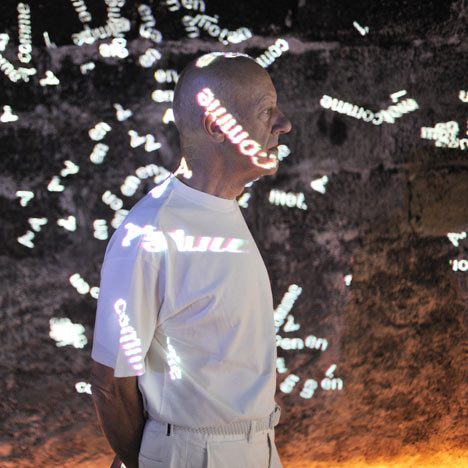Architect Norman Foster (above) has designed the entrance to the Corderie Arsenale exhibition at the Venice Architecture Biennale, where the names of generations of architects, critics, designers, landscape architects and planners are projected over the floor, columns and visitors.
The Gateway installation also features rapidly changing images of communal spaces flashing overhead in an installation by Carlos Carcas, one of the directors of 2010 film How Much Does Your Building Weigh, Mr Foster?
The images were sourced from architects, planners, photographers, critics, writers and artists around the world and show famous historic public spaces from western cities alongside meeting places in rapidly growing Asian and South American cities and favelas.
The installation sets up a dual interpretation of biennale director David Chipperfield's theme of Common Ground, highlighting both the heritage that architects share as a profession and the issues surrounding physical common spaces, before visitors move on to the rest of the Arsenale.
Meanwhile, over at the Central Pavilion in the Giardini, Foster presents an exhibition about the communal space at the base of his famous Hongkong and Shanghai Banking Corporation headquarters below.
Above: Occupy the Bank, photo by John Nye
The biennale opens to the public tomorrow and runs until 25 November. See all our stories so far here, check out photos from the preview on Facebook and watch David Chipperfield talk about his chosen theme in our movie interview here.
See all our stories about Foster + Partners »
Portrait is by Paolo Rosselli. Exhibition photos are by Carlos Carcas.
Here's some more information from Foster + Partners:
Norman Foster has curated two spaces for the 2012 Venice Architecture Biennale: the ‘Gateway’ installation at the head of the Arsenale, which is the first gallery that visitors pass through within the Corderie. The second space is in the Central Pavilion in the Giardini.
Norman Foster has chosen to interpret the theme of Common Ground in two ways. First in words, as the body of knowledge represented by the names of generations of architects, critics, designers, landscape architects and planners, who from antiquity to today have influenced the urban world. Secondly though images, which show the communal gathering spaces that bring us all together socially, outside or inside buildings.
For the ‘Gateway’ installation in the Arsenale, Norman Foster brings these two interpretations of the theme together in the words and images which he selected to create a black box experience. Visitors enter via symmetrical ramps into an immersive space, in which the floor and audience are washed by projected words, white on black and constantly in motion. On the walls of the space, projections of huge, rapidly changing images flash above the heads of the audience in an installation by filmmaker Carlos Carcas. They range from the historic spaces of the western world, to the booming new cities of Asia and South America, as well as the favelas, which are an inseparable part of these emerging urbanities. In the spirit of Common Ground, these thousands of images have been solicited from a global network of architects, planners, photographers, critics, writers and artists. The fusion of names and images are accompanied by a background soundtrack specifically composed for the installation.
The installation has been made possible by the Norman Foster Foundation and Ivorypress.
In the Central Pavilion in the Giardini, an exhibition focuses on the plaza below the Hongkong and Shanghai Bank tower as a gathering space. There were several early design variations for the Bank, which culminated in the final scheme, completed in 1985. The common denominator from the outset was a civic space created by lifting the building up to ensure a flow of pedestrian movement across the site.
Through models, sketches, drawings and photographs, the exhibition shows the evolution of the design of this public space and the tower that defines it, culminating in a photograph of the building by the artist Andreas Gursky. On Sundays, this space is transformed into an outpost of the Philippines, as hundreds of maids establish a community, with an extraordinary variety of social activities and intimate spaces created by cardboard walls. This aspect of the Bank is also explored in the work of artist Marisa Gonzalez. The triptych painting of the banking hall by Ben Johnson complements the view of the plaza from above by the photographer John Nye.
In the Hong Kong Pavilion in the Arsenale, Foster + Partners’ design for the Kai Tak Cruise Terminal, part of the redevelopment of the former airport site, has been selected and curated by Chris Law. Continuing the theme of Common Ground, the terminal features a large public roof garden, set against the stunning backdrop of the city.
Credits:
Gateway
Curator: Norman Foster
Concept & Design: Norman Foster with Ivorypress team
Production: Elena Ochoa Foster and Antonio Sanz (Ivorypress), Katy Harris and Matthew Foreman (Foster + Partners)
Film Director & Editor: Carlos Carcas
Art Installation: Charles Sandison
Sponsors: The Norman Foster Foundation and Ivorypress
Hongkong and Shanghai Bank HQ
Curator: Norman Foster
Concept & Design: Norman Foster
Artists: Norman Foster, Andreas Gursky, Ben Johnson, John Nye, Marisa Gonzalez
Production: Elena Ochoa Foster and Antonio Sanz (Ivorypress), Spencer de Grey and Katy Harris (Foster + Partners)
Lenders: Andreas Gursky, HSBC, The Norman Foster Foundation, Foster + Partners
Sponsors: The Norman Foster Foundation and Ivorypress

